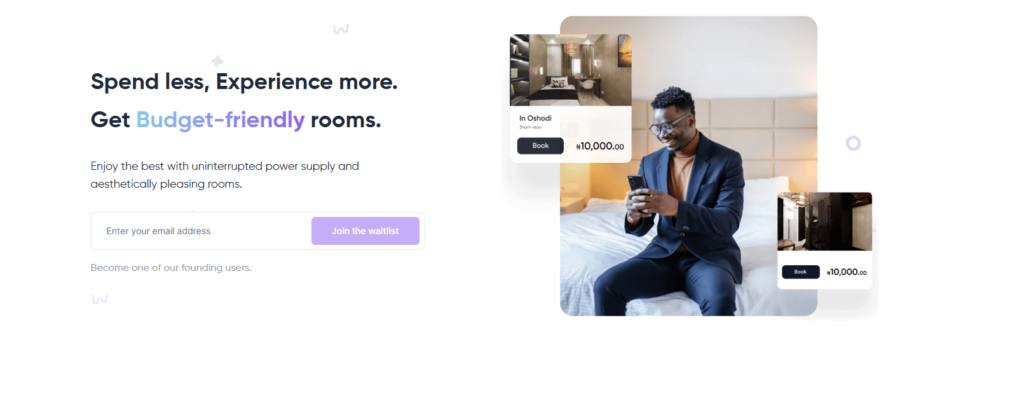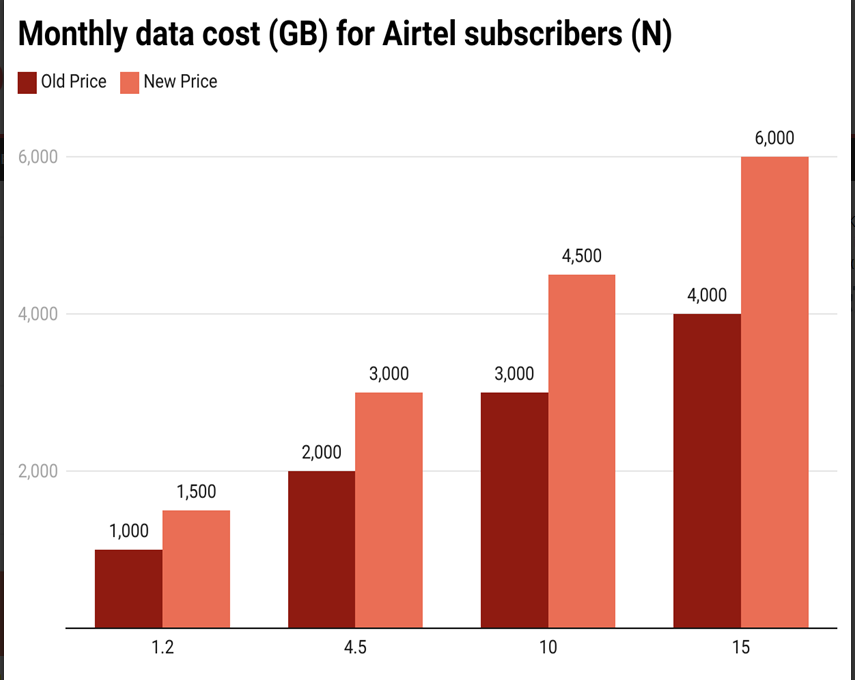
Navigating Data Price Hikes: How to Manage Your Internet Costs as a Freelancer in 2025

As data prices in Nigeria continue to rise, freelancers are facing increasing challenges in managing their internet costs. With data providers hiking prices regularly, staying connected while keeping costs down is becoming more difficult for independent professionals who rely on the internet for work. In 2025, managing internet costs is a necessity for freelancers trying to stay afloat in an economy marked by inflation and rising living expenses.
This guide will explore practical tips to help freelancers navigate data price hikes in Nigeria, offering strategies on data management, choosing the right data plan, and discovering alternative solutions like data-sharing and utilizing co-working spaces.

Are you a business traveler looking for a comfortable place to stay while you work remotely in Lagos? Join our waitlist now for exclusive access to fully-equipped temporary stays designed for professionals.
Why Data Price Hikes Are Impacting Freelancers in 2025
The increase in data prices in Nigeria is a direct result of several factors:
- Rising operational costs faced by telecom providers.
- High inflation rates, which affect the prices of all goods and services.
- Government regulations and taxes that increase costs for internet service providers (ISPs).
For freelancers who depend on the internet for tasks like research, client meetings, file uploads, and communications, data price hikes are a significant challenge. These rising costs can eat into your monthly budget, especially if you’re working with clients internationally or on bandwidth-intensive projects.
Effective Tips for Managing Your Internet Costs as a Freelancer
Managing your internet costs effectively involves smart planning, data management, and resourcefulness. Here are some actionable tips you can use to reduce internet-related expenses and still maintain productivity.
1. Understand Your Internet Usage: Track Data Consumption
The first step in managing your data costs is to track how much data you actually use. Freelancers often pay for high data plans, but sometimes only a fraction of the data is used effectively.
How to Track Your Data Usage:
- Use apps provided by your data provider (e.g., MTN, Glo, Airtel) to monitor your data consumption.
- If your provider doesn’t offer a built-in tracking tool, use third-party apps like MyDataManager or GlassWire to track usage on your mobile devices and laptops.
Tip: After tracking your usage for a few weeks, you may find you’re paying for more data than you need. Adjusting your plan accordingly can save you money.

2. Choose the Right Data Plan: Balance Cost and Need
Data plans can vary greatly, and often, freelancers are unknowingly paying for excess data that they don’t need. In 2025, with prices climbing, it’s crucial to select a plan that fits both your work demands and budget.
How to Choose the Right Plan:
- Consider your work type: If you primarily work with text-based tasks (e.g., writing, email communication), a lower data plan may suffice. If you regularly conduct video calls, download large files, or upload multimedia, a larger data plan might be necessary.
- Prepaid vs. Postpaid: Prepaid plans may offer more flexibility, but postpaid plans can sometimes provide bulk discounts or bonus data.
Example:
- For lighter users (social media, emails, research): a 1GB or 5GB plan may be sufficient.
- For heavy users (video calls, large file uploads/downloads): a 10GB or 20GB plan might be necessary.
3. Switch Between Providers for Better Deals
With several telecom providers in Nigeria, competition among them sometimes leads to better data pricing. Switching providers or taking advantage of special promotions could help you find more affordable options.
How to Take Advantage of Switching Providers:
- Compare data plans from major providers (MTN, Glo, Airtel, 9mobile) before making a commitment.
- Keep an eye out for promotions, especially during festive seasons or national events when telecom companies often roll out special deals.
Pro Tip: Set a reminder to check for deals every 3-6 months so that you don’t miss out on better pricing opportunities.
4. Leverage Data-Sharing: Pool Resources with Family or Colleagues
One of the easiest ways to cut down on data costs is to share your data plan with family or colleagues who have similar needs. Data-sharing packages are often available from providers and allow you to pool resources and split costs.
Benefits of Data Sharing:
- Cost-efficiency: You can share larger data plans without each person needing to purchase their own individual plan.
- Flexibility: Family members or co-workers can contribute to paying for the data, lightening the financial burden.
Example: Some providers, like MTN, offer data-sharing plans where you can share your data with up to 5 other people, giving you the chance to split the cost and benefit from bulk data at a lower cost per individual.
5. Use Wi-Fi Hotspots & Co-Working Spaces for Reliable Internet Access
If working from home or a personal space isn’t always feasible due to data limits, consider using co-working spaces or public Wi-Fi hotspots. These venues often have high-speed internet, and by purchasing a daily or monthly membership, you can access consistent internet at a fraction of the cost of individual data plans.
How Co-Working Spaces Can Help:
- Access to Unlimited Data: Many co-working spaces in major Nigerian cities like Lagos, Abuja, and Port Harcourt offer unlimited high-speed internet for their members.
- Networking Opportunities: Working in a co-working space isn’t just about saving on data—it’s also a great opportunity to meet potential clients, other freelancers, and collaborators.
Pro Tip: If you don’t have a co-working space nearby, look for cafes, libraries, or other public areas that offer free Wi-Fi. Many businesses now cater to remote workers by providing high-speed Wi-Fi and a comfortable working environment.

Are you a business traveler looking for a comfortable place to stay while you work remotely in Lagos? Join our waitlist now for exclusive access to fully-equipped temporary stays designed for professionals.
6. Consider Alternative Internet Solutions: Unlimited Data Plans & Fiber Optics
If your data costs have reached unsustainable levels, consider investing in alternative internet solutions. These options may involve an initial setup cost but can save you money in the long run.
- Fiber-optic broadband: Available in some Nigerian cities, fiber-optic internet offers unlimited data plans with fast, reliable connections. Though initially expensive, this can be a cost-effective long-term solution.
- Satellite internet: Emerging providers like Starlink offer satellite internet with no data caps, which could be an alternative if you live in areas with limited 4G/5G coverage.
Airtel Router vs. MiFi vs. Starlink: Choosing the Right Internet Provider for Freelancers
When it comes to choosing an internet provider, freelancers have multiple options to consider in Nigeria, such as Airtel routers, MiFi devices, and Starlink satellite internet. Each option comes with its own set of benefits and drawbacks, so it’s important to select the one that best fits your work style and budget.
1. Airtel Router
Airtel offers fixed broadband routers that are ideal for home offices or freelancers who prefer a stable connection and have a consistent need for data. Their routers often come with a variety of data plans, and you can choose a plan that fits your usage.
Pros:
- Reliable connection with fast speeds for streaming, video calls, and file sharing.
- Multiple device connections: Allows multiple devices (laptops, phones, etc.) to connect simultaneously.
- No data cap on some plans (You can get the 25k unlimited plan on airtel router plan).
Cons:
- Limited availability in rural areas or non-urban locations.
- Initial setup cost: It may require a one-time purchase for the router.
2. MiFi (Mobile Hotspot)
MiFi devices, like those offered by MTN, Airtel, and Glo, provide mobile hotspots that can connect multiple devices. They’re compact, portable, and allow freelancers to work from various locations.
Pros:
- Portability: Ideal for freelancers who work in different locations (home, cafes, co-working spaces).
- Flexible data plans: Rechargeable, giving you control over your data usage.
- Multiple device support: Connect multiple devices to a single MiFi device.
Cons:
- Data speed may fluctuate depending on location and signal strength.
- Limited battery life: Requires regular charging, which can be inconvenient for long work hours.
3. Starlink (Satellite Internet)
Starlink is an emerging satellite internet provider that offers unlimited data with consistent speeds. It’s particularly useful for freelancers who live in areas where mobile data providers have limited coverage.
Pros:
- Unlimited data: No data caps or restrictions.
- High-speed connection ideal for video conferencing, large file downloads, and more.
- Coverage in remote areas: Works even in areas where traditional mobile networks don’t reach.
Cons:
- High setup cost: The hardware (dish and receiver) requires an upfront investment.
- Availability: While Starlink is expanding, it may not be available in all Nigerian locations just yet
Final thoughts
With data price hikes becoming a persistent issue in 2025, freelancers in Nigeria need to take a proactive approach to manage their internet costs effectively. By tracking data usage, choosing the right plan, leveraging data-sharing, and exploring alternative solutions like co-working spaces or fiber-optic broadband, you can significantly reduce your expenses while still maintaining reliable internet access for your freelance business.
As data prices continue to rise, it’s essential to be flexible, explore new strategies, and stay informed about the latest options in the market. Managing your internet budget efficiently will not only save you money but also ensure that your business remains operational, productive, and competitive.
Remember: Smart data management is not just about saving money, it’s about enabling your business to thrive in an ever-evolving digital landscape.

